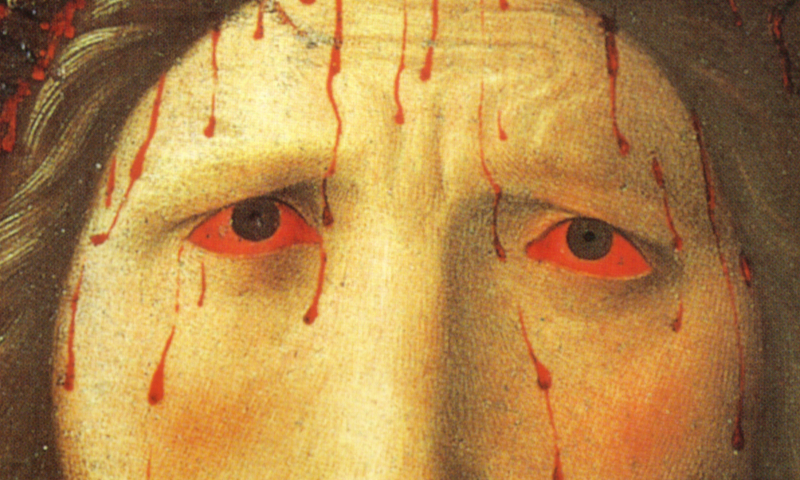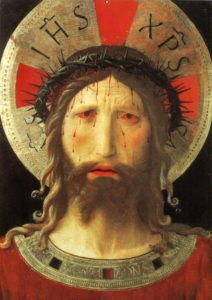At first glance, I was viscerally repulsed by the above painting. It was the eyes in particular, and the mouth, both of the same shade of red. Eyes shouldn’t be that red. It was hideous. The feeling of revulsion reminded me of when—as a child—I turned the page of an illustrated fairy tale to be confronted by the image of a ghoulish sorceress: I remember immediately slamming the book shut and with such instinctive vehemence that the book caught and pinched me hard.
He was despised and rejected by men;
a man of sorrows, and acquainted with grief;
and as one from whom men hide their faces
he was despised, and we esteemed him not. (Isa 53:3)
I remember as a novice sitting in the sanctuary of St. Gertrude’s in Madeira, Ohio, and hearing my novice master preaching: “Jesus Christ is the most beautiful thing that ever happened in the universe.” I hadn’t spent much time considering Jesus as a beautiful thing, but the truth of the statement caught me up. Of course he is. How could he not be?
I grew tall like a cedar in Lebanon…
and like choice myrrh I spread a pleasant odor…
my branches are glorious and graceful.
Like a vine I caused loveliness to bud. (Sir 24:13–17)
And this Beauty is personally interested in me.
“Jesus knew and loved us each and all during his life, his agony and his Passion, and gave himself up for each one of us … He has loved us all with a human heart” (Catechism of the Catholic Church 478).
The Incarnation is entirely for us and individually so. Jesus Christ speaks wholeheartedly to all as if each man, woman, or child were the only human being:
My beloved speaks and says to me:
“Arise, my love, my fair one, and come away…
O my dove, in the clefts of the rock…
let me see your face,
let me hear your voice,
for your voice is sweet,
and your face is comely.” (Song 2:10-14)
How is it that we are repulsed? What mars the appearance of this Beauty? Why do passages of Scripture jar with each other like an unresolved chord?
He had no form or comeliness that we should look at him,
and no beauty that we should desire him. (Isa 53:2)
“Come to me, you who desire me,
and eat your fill of my produce.
For the remembrance of me is sweeter than honey.” (Sir 24:19-20)
I am the scorn of all my adversaries,
a horror to my neighbors,
an object of dread to my acquaintances;
those who see me in the street flee from me. (Ps 31:11)
How can the source and reference point for all beauty appear such that we want nothing more than to run away?
For our sake he made him to be sin who knew no sin, so that in him we might become the righteousness of God. (2 Cor 5:21)
✠
Image: Fra Angelico, Christ Crowned with Thorns








